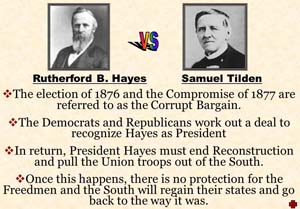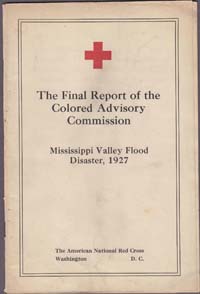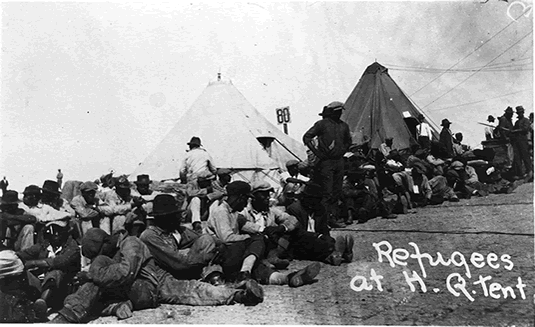- Mar 11, 2015
- 76,608
- 33,383
- 2,330
These events are part of republican history and are major reasons blacks left the party.
1876 US ELECTION: The Corrupt Bargain -- Republicans (Hayes) made a back room deal with the Democrats to gain control of the Presidency
The period after the Civil War, 1865 - 1877, was called the Reconstruction period. Abraham Lincoln started planning for the reconstruction of the South during the Civil War as Union soldiers occupied huge areas of the South.

The Compromise of 1876 and the removal of federal troops from the South by order of President Rutherford B. Hayes on May 1, 1877 ended Reconstruction. Reconstruction was the time between 1865 and 1877 when the federal government set the laws in which the southern states were allowed to be readmitted back into the United States. All former Confederate states were admitted back into the country by 1870.
FACT: The Republicans (Hayes) sold out African Americans in the South to gain power of the White House.
1927 Great Mississippi River Flood: Republicans (Hoover) made a back room deal with Robert Russa Moton and then experienced selective amnesia...
The final Report of the Colored Advisory Commission Appointed with The American National Red Cross and the President's Committee on Relief Work in the Mississippi Valley Flood disaster of 1927. Extremely scarce copy, owned by The Freeman Institute Black History Collection. The American National Red Cross, Washington DC, 1927 (illustrated 30 pages). Less than a month after the nation's biggest flood disaster, a 17-member commission of prominent African Americans, led by Tuskegee Institute's Robert Moton submitted their report on the disaster. They had been charged with learning whether African American victims of the flood were subject to discrimination "in matters of treatment, living conditions, work details, and relief given."
BACKGROUND: Secretary of Commerce during the Coolidge administration, Herbert Hoover had his eye on the presidency. When President Coolidge placed Hoover in command of all flood relief operations during the disaster, it seemed to be the perfect vehicle to raise his national profile and revive his reputation as the "Great Humanitarian." Drawing on lessons he had learned feeding the starving European victims of World War I, Hoover swept into action. He cut through bureaucratic red tape, got aid to victims devastated by the flood and was dubbed a hero by the national press. There was only one thing that could tarnish Hoover's glowing image -- the treatment of African Americans in the Washington County levee camps. Hoover had visited the area and had approved the local flood relief committee's decision, under the leadership of Will Percy, to keep the African American refugees on the levee.

Moton's Final Report
But as conditions deteriorated in the camps, word slowly filtered North, and the scandal threatened to derail Hoover's presidential ambitions. Hoover's friends urged him to get what they called "the big Negroes" in the Republican Party to quiet his critics, and Hoover turned to Robert Moton for the job. Hoover formed the Colored Advisory Commission, led by Moton and staffed by prominent African Americans, to investigate the allegations of abuses in the flood area. The commission conducted a thorough investigation and reported back to Moton on the deplorable conditions. Moton presented the findings to Hoover, and advocated immediate improvements to aid the flood's neediest victims.
FACT: Herbert Hoover experienced "selective amnesia" with the non-delivery of his promise to Robert Russa Moton...which made Moton angry.....angry enough to launch an anti-Republican movement. Enter the New Deal in the 1930s and one can see how the anti-GOP movement has steadily changed the way African Americans have voted.
Great Mississippi Flood of 1927: Blacks put in Concentration Camps

http://originalpeople.org/great-mississippi-flood-of-1927/
Black Oppression and the Great Mississippi Flood of 1927
Black Lives Sacrificed to Flood Control
In 1927 as the rivers spilled over, black work gangs were rounded up to toil in dangerous and ultimately pointless attempts to stay the water. In Mounds Landing, Mississippi, north of the main Delta town of Greenville, over 2,000 black men were forced at gunpoint to fill and throw sandbags onto the levee. On April 21, the levee was breached, releasing water with a force greater than Niagara Falls. Many in the work gangs who were reinforcing the levee were swept into the torrent. The official account, by a National Guard officer at the site, stated, “No lives were lost among the Guardsmen.”
The federal government didn’t contribute a dime of direct aid to the thousands of flood victims, despite a record budget surplus. The Red Cross established racially segregated camps in the flood zones. Black families lived in floorless tents in the mud without cots, chairs or utensils, eating inferior rationed food. Sometimes forced to work on the levees without pay, black men had to wear tags identifying that they were laborers in order to receive rations, and to show which plantation they “belonged to.” Women with no working husband did not get supplies unless they had a letter from a white man.
Policing the camps, the National Guard supervised the workers, whipping and beating the men. At least one black woman was gang-raped and killed by Guardsmen. Typhoid, measles, mumps, malaria and venereal diseases ran rampant among destitute tenant farmers and mill workers already weakened from illnesses endemic to poverty, such as tuberculosis and pellagra. The Chicago Defender (4 June 1927) even reported that “those who die are cut open, filled with sand then tossed into the Mississippi River.” Such horrors were stark proof that the poisonous legacy of chattel slavery still infected the land some 60 years after the Civil War.
Black Oppression and the Great Mississippi Flood of 1927
1876 US ELECTION: The Corrupt Bargain -- Republicans (Hayes) made a back room deal with the Democrats to gain control of the Presidency
The period after the Civil War, 1865 - 1877, was called the Reconstruction period. Abraham Lincoln started planning for the reconstruction of the South during the Civil War as Union soldiers occupied huge areas of the South.

The Compromise of 1876 and the removal of federal troops from the South by order of President Rutherford B. Hayes on May 1, 1877 ended Reconstruction. Reconstruction was the time between 1865 and 1877 when the federal government set the laws in which the southern states were allowed to be readmitted back into the United States. All former Confederate states were admitted back into the country by 1870.
FACT: The Republicans (Hayes) sold out African Americans in the South to gain power of the White House.
1927 Great Mississippi River Flood: Republicans (Hoover) made a back room deal with Robert Russa Moton and then experienced selective amnesia...
The final Report of the Colored Advisory Commission Appointed with The American National Red Cross and the President's Committee on Relief Work in the Mississippi Valley Flood disaster of 1927. Extremely scarce copy, owned by The Freeman Institute Black History Collection. The American National Red Cross, Washington DC, 1927 (illustrated 30 pages). Less than a month after the nation's biggest flood disaster, a 17-member commission of prominent African Americans, led by Tuskegee Institute's Robert Moton submitted their report on the disaster. They had been charged with learning whether African American victims of the flood were subject to discrimination "in matters of treatment, living conditions, work details, and relief given."
BACKGROUND: Secretary of Commerce during the Coolidge administration, Herbert Hoover had his eye on the presidency. When President Coolidge placed Hoover in command of all flood relief operations during the disaster, it seemed to be the perfect vehicle to raise his national profile and revive his reputation as the "Great Humanitarian." Drawing on lessons he had learned feeding the starving European victims of World War I, Hoover swept into action. He cut through bureaucratic red tape, got aid to victims devastated by the flood and was dubbed a hero by the national press. There was only one thing that could tarnish Hoover's glowing image -- the treatment of African Americans in the Washington County levee camps. Hoover had visited the area and had approved the local flood relief committee's decision, under the leadership of Will Percy, to keep the African American refugees on the levee.

Moton's Final Report
But as conditions deteriorated in the camps, word slowly filtered North, and the scandal threatened to derail Hoover's presidential ambitions. Hoover's friends urged him to get what they called "the big Negroes" in the Republican Party to quiet his critics, and Hoover turned to Robert Moton for the job. Hoover formed the Colored Advisory Commission, led by Moton and staffed by prominent African Americans, to investigate the allegations of abuses in the flood area. The commission conducted a thorough investigation and reported back to Moton on the deplorable conditions. Moton presented the findings to Hoover, and advocated immediate improvements to aid the flood's neediest victims.
FACT: Herbert Hoover experienced "selective amnesia" with the non-delivery of his promise to Robert Russa Moton...which made Moton angry.....angry enough to launch an anti-Republican movement. Enter the New Deal in the 1930s and one can see how the anti-GOP movement has steadily changed the way African Americans have voted.
Great Mississippi Flood of 1927: Blacks put in Concentration Camps

http://originalpeople.org/great-mississippi-flood-of-1927/
Black Oppression and the Great Mississippi Flood of 1927
Black Lives Sacrificed to Flood Control
In 1927 as the rivers spilled over, black work gangs were rounded up to toil in dangerous and ultimately pointless attempts to stay the water. In Mounds Landing, Mississippi, north of the main Delta town of Greenville, over 2,000 black men were forced at gunpoint to fill and throw sandbags onto the levee. On April 21, the levee was breached, releasing water with a force greater than Niagara Falls. Many in the work gangs who were reinforcing the levee were swept into the torrent. The official account, by a National Guard officer at the site, stated, “No lives were lost among the Guardsmen.”
The federal government didn’t contribute a dime of direct aid to the thousands of flood victims, despite a record budget surplus. The Red Cross established racially segregated camps in the flood zones. Black families lived in floorless tents in the mud without cots, chairs or utensils, eating inferior rationed food. Sometimes forced to work on the levees without pay, black men had to wear tags identifying that they were laborers in order to receive rations, and to show which plantation they “belonged to.” Women with no working husband did not get supplies unless they had a letter from a white man.
Policing the camps, the National Guard supervised the workers, whipping and beating the men. At least one black woman was gang-raped and killed by Guardsmen. Typhoid, measles, mumps, malaria and venereal diseases ran rampant among destitute tenant farmers and mill workers already weakened from illnesses endemic to poverty, such as tuberculosis and pellagra. The Chicago Defender (4 June 1927) even reported that “those who die are cut open, filled with sand then tossed into the Mississippi River.” Such horrors were stark proof that the poisonous legacy of chattel slavery still infected the land some 60 years after the Civil War.
Black Oppression and the Great Mississippi Flood of 1927


 ..
.. 